Cars: Buying or Leasing? New or Pre-Owned?
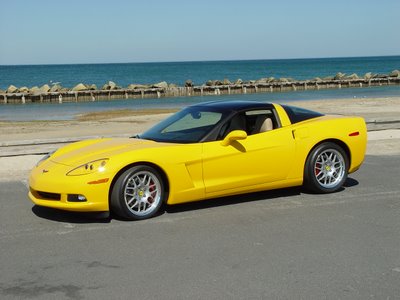 Unless you live in downtown New York, or are under 16 or over 80, you probably drive a car. And so you have probably considered the question of whether to buy a car or lease one. And should the car itself be a brand new one, or a pre-owned one? And if pre-owned, how old should it be, and why?
Unless you live in downtown New York, or are under 16 or over 80, you probably drive a car. And so you have probably considered the question of whether to buy a car or lease one. And should the car itself be a brand new one, or a pre-owned one? And if pre-owned, how old should it be, and why?
Cars usually don’t last forever, so these are questions we all face every few years, when the time comes to get rid of the old one and trade up.
Before venturing an opinion, I should probably state my own personal experience level, so you can tell that I have no particular biases. I do not have any specific ‘religions’ when it comes to cars, and I have no particular agenda either. I am not selling anything or promoting anything. I am merely talking about my own experiences and sharing some logical, fair-minded discussion on the subject which should illuminate the issue for some people, and hopefully even help someone with a car decision. My brother just bought a car, and so we have had in-depth discussions on this subject recently, and I thought I would put some of the information here.
These are the cars I personally have gone through in the last 33 years of driving.
1. 67 Pontiac Tempest (bought used)
2. 69 Chrysler Newport (bought used)
3. 75 Honda Civic (bought used)
4. 69 Ford camper van (bought used)
5. 77 Pacer wagon (bought used)
6. 79 Mustang (bought new)
7. 83 Trans Am (bought new)
8. 86 Nissan SUV (bought new)
9. 85 Nissan 300 ZX Turbo (bought used)
10. 84 Jaguar XJ6 Sovereign (bought used)
11. 89 Chrysler New Yorker (bought new)
12. 91 Plymouth Laser (Mitsubishi Eclipse, bought new)
13. 94 Toyota Previa (minivan) (leased new, then bought) *still have this
14. 91 Cadillac Coupe DeVille (bought used)
15. 92 Cadillac Eldorado (bought used)
16. 97 GMC hightop conversion van (full size) (bought new) *still have this
17. 97 Lexus SC400 (bought used)
18. 98 Jaguar XK8 convertible (bought used) *still have this
As you can see, I have tried both new and used, and I have had American cars, and Japanese cars, and European cars. I have had cheap cars and expensive cars. I have had sedans, station wagons, SUV’s, vans, and sports cars. I have had convertibles and hardtops. I have bought and sold through dealerships large and small, and privately with individuals. So I have tried a lot of different scenarios. Also, I have financed in different ways, and paid cash, and leased, and then bought.
For some, buying a car is a practical decision. It’s all about the numbers. They look at it like an accountant. They realize that any car is a depreciating asset and is therefore not an investment but rather it is simply an expense, and so it makes sense to pay as little as possible for it, all things said. But for most of us, buying a car is an emotional decision. This is because it says a lot about who you are. Your tastes, your lifestyle. It is your second biggest expense after your house. And since people can’t invite everyone over to their house, this is how they show their lifestyle to others. For some it is like a status report on how they are doing. If they drive a nice, expensive car, it implies they are doing well in life. And if they are driving an old broken-down rust-bucket, it implies that things are not so rosy for them at the moment.
For some, it is purely utilitarian. They need certain attributes in a vehicle for the things they need to do. They need a pickup truck, because they carry a lot of outdoor-related stuff. Equipment, building supplies, etc. They need a minivan because of the volume of kids and stuff. Or a conversion van for highway trips because they like to go on road trips (I bought one for that reason), or maybe they need a 4-wheel-drive because of where they live or need to go. Or maybe they have to pull a trailer, or carry band equipment, or maybe they are a student or an older person on a fixed income and need light gas mileage , but don’t need much space. There are all kinds of needs, and all kinds of vehicles to fit those needs.
I wouldn’t presume to offer advice of what type of vehicle to get because everyone’s needs are different. But, once the vehicle type is chosen, everyone does have the same decisions to make about whether to lease it or buy it, and whether it should be new or used.
First let me say this: A car does not cost what you pay for it. Rather, a car costs the DIFFERENCE between what you pay for it when you buy it, and what you sell it for when you are finished with it, plus the maintenance and financing costs. Capice?
Think about it. If you bought a car for $20,000 cash and did no maintenance on it and sold it again a year later for $20,000, then that car cost you nothing. Not $20,000. Nothing. Even if the car was $50,000. Or $70,000. It doesn’t matter. If you got all your money back when you sold it, then it cost you nothing. This is how a $50,000 car might be cheaper than a $30,000 car, in some cases.
If the $30,000 car depreciates to say, $10,000 in a year, and the $50,000 car depreciates to $40,000 in that same year, then the higher-end car only cost half of the lower end car. This is certainly possible, since depreciation is based upon supply and demand. And that helps you decide whether or not to buy a new or used model of the car you like.
My brother just leased a new GM G6, and then talked to me and changed his mind. He took it back and then bought a 1 year old Grand Prix for $17,000. Think about this for a second. This car is $31,000 brand new. Last year, sometime in 2005, somebody bought this car and paid about $36,500 for the car plus taxes and licensing. Then, he traded it in to this dealer. Dealers have to make about $6,000 or $7,000 profit on every car, or they can’t afford to stay in business. So, in order for the dealer to make his $6,000 profit on this car and still sell it to my brother for $17,000, that means that they must have paid the former owner about $11,000 for it. So that former owner took a huge hit on depreciation in one year. Literally, it cost him over $25,000 to drive that Pontiac for a one year. That’s a pretty expensive way to go.
By contrast, my brother might drive this car for 2 years and get a trade-in value of about 9,000, in which case, it will have cost him about $9,000, or $4500 to drive the same car for the same length of time. Roughly one fifth the cost. And, as a 2 or 3 year old car, there will still not be any significant maintenance on it yet.
Car manufacturers would like you to pay them a monthly payment for as long as you drive a car. For life. To that end, they have figured out that the average person now gets a 5 year loan when buying a new car. So, they simply engineer the car to last for about 5 years and then start to require maintenance. That way, when you are finished making financing payments, you can begin making maintenance payments. Or, if you tire of making the maintenance payments, or tire of bringing your car in for repair, or become nervous that your next maintenance job will be a huge one, then you trade in that car and buy another one and start all over again making financing payments. That’s the cycle. That is how they hook people for life.
But there is a sweet spot of ownership there, which occurs AFTER the bulk of the depreciation is over, but before the maintenance begins. From 2 years old to 5 yrs old. For American cars, this is the ideal time to own it from a financial perspective. Usually, after 2 years, you can buy it for about half the price of new, but still have 3 good years of driving before you start making repairs. And if you have an extended bumper-to-bumper factor warranty, then you’re covered anyway. That is the sweet spot for American cars.
The only problem with that is that every 3 years, you would be selling your old car and buying something newer again – and remember that the dealers want to make about $6K or $7K or each transaction. So It’s STILL a little expensive. Less than buying new, but still expensive.
So I’ve decided to get higher-end cars. Jaguar, and Lexus, BMW, Mercedes, etc. These seem to last longer, and once their initial depreciation is over, they don’t keep dropping as fast. The depreciation slows down quite a bit. And the warranties are pretty good and last a while. So, by buying a high-end car that is say, 3 years old and keeping it say 4 or 5 years, You take advantage of the higher quality and better warranty to extend the time of ownership and therefore lessen the costs of dealership profits. Plus it’s pretty nice and a lot of fun driving a Jaguar convertible around, I can tell you! This one is mine.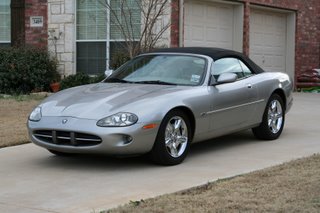
Over the years, my thinking has been that it is better to buy rather than lease. And that it is better to buy a car that is a couple of years old rather than new. That way someone else has paid the bulk of the depreciation instead of me.
Leasing
What is a lease, exactly? Well simply put, instead of financing the price of the car, you are financing the cost of the depreciation during the time you have it. In other words, they figure out how much the end-value is going to be in 3 years and subtract that from the brand new list price, and that difference is the cost of ownership of the car, then they finance THAT. You are only going to have the car for 3 years say, and then give it back. So they are going to sell you the financing for ownership during those 3 most expensive years of ownership, then they take the car back. You no longer have a car and so are forced to lease another one and continue paying. Forever.
I have not paid a monthly car payment in 3 years because I own my three vehicles. But if you lease, you will never be in that position. You will make car payments every month for the rest of your life. Period.
And if you decide you don’t like the car, tough luck, you are in a contract. You MUST finish out the lease term or suffer huge penalties. My brother just paid over $3,000 to terminate the lease on his Jeep a year early.
Since you are leasing, you cannot negotiate the list price paid for the new car, and you cannot negotiate the end price lower. All you can negotiate, if anything, is the monthly payment. Usually, they will not negotiate the interest rate. The rate is the highest, and the list price is the highest, so the only way to change the monthly payment lower is to either extend the term to extra years, or else raise the end-value. But you are responsible for making sure that they get their end value at the end of the lease, so you will simply have to make up the difference in a bubble-payment at the end of the lease. How does that sound to you? You pay a down payment up front, then make payments all along every month for three years, then at the end, you give them $5,000 or $6,000 dollars MORE, to give them the car back and have nothing. Now you start all over again from scratch.
No thanks.
So what is the attraction, then? If leases are so bad, then why do so many people lease cars? Well, a couple of reasons. Since you are not financing the full value of the car, only the depreciation, the monthly payment is slightly less than ownership. That means that people can either afford it on the monthly budget easier, or they get a fancier car than they could otherwise afford. If you could either drive a Ford Taurus for $399 per month or a BMW 325i for $399 per month on a lease, which would you prefer? 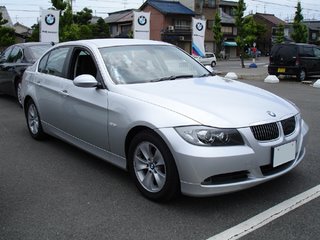 They are not thinking about what happens 3 years from now when they give the BMW back. They think, well, I’d probably only drive the Taurus 3 yrs as well anyway, so what’s the difference? The difference is that when you buy a car, you still own the car at the end. Now you have something you can sell, or trade in, or continue driving. You own something. You have built equity.
They are not thinking about what happens 3 years from now when they give the BMW back. They think, well, I’d probably only drive the Taurus 3 yrs as well anyway, so what’s the difference? The difference is that when you buy a car, you still own the car at the end. Now you have something you can sell, or trade in, or continue driving. You own something. You have built equity. 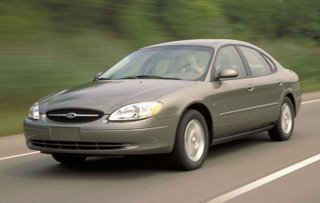 But at the end of the lease, chances are, you have a lump sum to PAY to exit the agreement, and also you own nothing, and have to give the car BACK, so you have nothing to drive either. So it’s attractive at the time of signing up, but at the end, it’s not so great. Most people just swallow the lump sum payment and turn right around and sign-up again for another lease, because they have no choice anymore by then.
But at the end of the lease, chances are, you have a lump sum to PAY to exit the agreement, and also you own nothing, and have to give the car BACK, so you have nothing to drive either. So it’s attractive at the time of signing up, but at the end, it’s not so great. Most people just swallow the lump sum payment and turn right around and sign-up again for another lease, because they have no choice anymore by then.
Some people think that they have a write-off on their taxes if they lease, but not if they buy. This is wrong. First, you can only write-off your car if you are self-employed. Not if you are an employee. Second, leasing doesn’t give you any bigger write-off than owning. It’s just done differently. When you own the vehicle, you can claim the depreciation and financing expenses. You don’t claim the owner’s equity because it is not an expense. You keep that. With a lease, since it is ALL depreciation and financing, you claim the entire payment. There IS no owner’s equity to keep. So it may be simpler to calculate the lease deduction, but they both work out the same.
When Buying New Makes Sense.
For most cars, it makes practical and financial sense to buy it a couple of years old to take advantage of the depreciation. But there are exceptions to this. If there is a brand new vehicle that you simply must have, then there ARE no used ones available. Like this year's new Pontiac Solstice/Saturn Sky sports car. That car didn't exist last year, so obviously, there are no used ones to be had. These two pictures are of the Pontiac Soltice. It's a beautiful little sports car, and I am tempted to get one! Not much power though, I'm afraid. Not yet.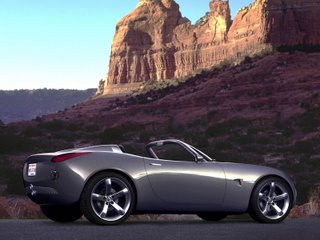
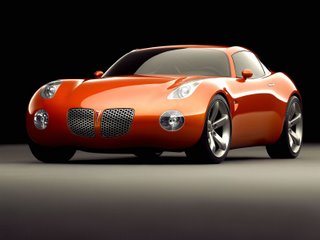
Also, it makes sense to buy new if there is a shortage of used ones for the model you are looking for – as with a Corvette or conversion vans. In both cases, people tend to hang on to those vehicles for a long period of time, so the availability of them just two years old or so is very limited. With limited supply and larger demand, the price goes up, and therefore they are less of a good deal than a new one sometimes.
This conversion van you see here is one I bought in 1997 brand new, because I literally could not find a used one less than 10 years old. And even then they wanted $15,000 for it. The list price on this one was $42,000, but I bought at the end of the model year and paid only $29,300. That seemed like a pretty good deal to me. In this case, new was better than used. As it turned out, I've had a lot of mechanical troubles with this, and at the moment the battery is dead, since I left it in the driveway without running it for a month, but that's a different issue.
It is also true that it may be better to buy new rather than used with many Hondas and Toyotas. People know these are good, reliable cars, so they want used ones, but that means demand is high, therefore prices are high for used ones, therefore often times it is just as good to buy a new one, since the depreciation is not enough to make it worthwhile to buy a 2 year old version.
Buying Some-one Elses Troubles
The other aspect of buying a used car is the old addage, "If you are buying a used car, you are buying someone else's troubles." First of all, you can have just as many troubles with a new car as with a used car. I certainly did when I bought my GMC van. It has had 2 engine jobs, a complete transmission rebuild, new fuel pump, new brakes 3 times, new tires 3 times, and new batteries 3 times, and all that was before it even had 53,000 miles on the odometer. And now that it's dead again, I guess it will need a 4th battery.
But, you say, with a new car at least the dealer has to fix them. Well, as long as it's covered under warranty, then the dealer has to fix them with a used car as well.
In the case of this new vehicle, the dealer's warranty ran out just before all these repairs were needed. So It has cost me well over $5,000 in repairs from my own pocket. Buying new gave me NO advantages in the maintenance/repair area.
On the other hand, I bought my Jaguar XK8 convertible as a 4 year old pre-owned car. and I haven't had these kinds of problems. I had a couple of minor things done, and they were covered under warranty. Last year I replaced a battery (it gets hot here in Texas) And recently, I had a $233 repair done to replace an engine mount. So In 80,000 miles, it has had a LOT less money spent in repairs than my American made van that I bought brand new. So the old addage is disproven.
Bottom Line
You have many choices. I hope some of this helps. My bottom line is that usually it is best to buy a good quality brand name car 2 or 3 years old and keep it as long as you can before you get rid of it. That will give you a nice car, and in the end, will probably cost you less money overall.


7 Comments:
I agree 100% - my own experience brought me to the same conclusion:
if all you want from a car is, er, vehicle,
- then the best strategy is to by a trouble-free 2yr old one.
I'd even add - go with plain toyota or honda - after 2yrs (with a caring owner or on a lease) they are as good as new.
For a plain toyota/honda, during first 2yrs the depreciation eats the "brand mark-up", not the value of the vehicle - so you effectively buy a nearly-new car without paying "brand/fashion surcharge"!
Thank you, japanese people, for teaching the world what the quality should be!
I don't live in downtown New York, but I do live in Chicago and LOVE not owning a car. Love it.
Lauren,
I always wonder how you bring home groceries and other shopping items when you don't own a car. Do you take cabs everywhere all the time? Can you literally walk to everything you ever need? Can you carry everything you ever need to buy in your arms?
I can't imagine being without my car. I LOVE my car.
v
I NEVER take cabs. Only if I have to go to the airport REAL early in the morning, then maybe. Chicago has a lil something called public transportation. And for the most part it's WONDERFUL. $75 for a monthly unlimited pass. I can't imagine anyone who can walk to everything they need. And there is a grocery store about 3 blocks from my place. I live alone in a small place so I don't keep that much food around anyway. I buy what I can carry. Saves money and my waistband. ;)
Oh and this is Chigurl7 from the ej list/msg board - though I rarely every post there anymore. I used to comment on ev's blog as well. In case you were wondering.
Actually, I seem to be Lauren7 on the ej board. My email was always chigurl7 on the old mailing list.
I say, buy used cars! Orange County has the best offers in pre-owned and used. I think I saved more money when I bought a 2009 Toyota RAV4 Basic. I haven't experienced any engine mishaps so far. In fact, I bought it like it's brand new. Well, except for the price. Totally a good buy.
Thanks for sharing information regarding Best Pre Owned Car Deals In Spring. I read this blog and I found it very useful. For buying just click on Texans Auto Group now
Post a Comment
<< Home